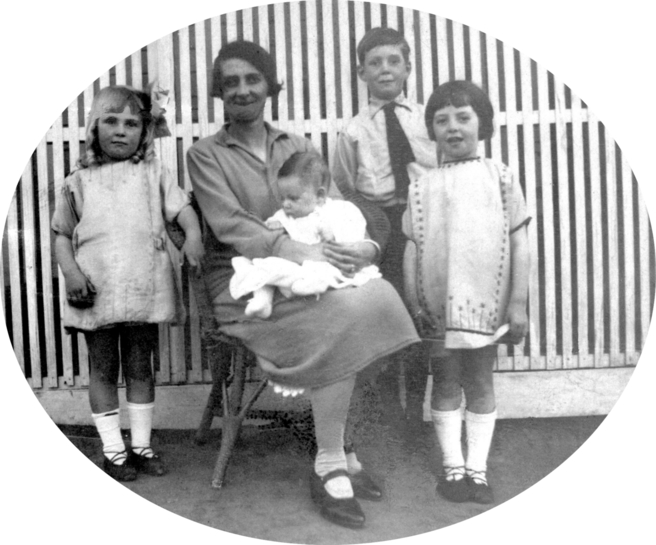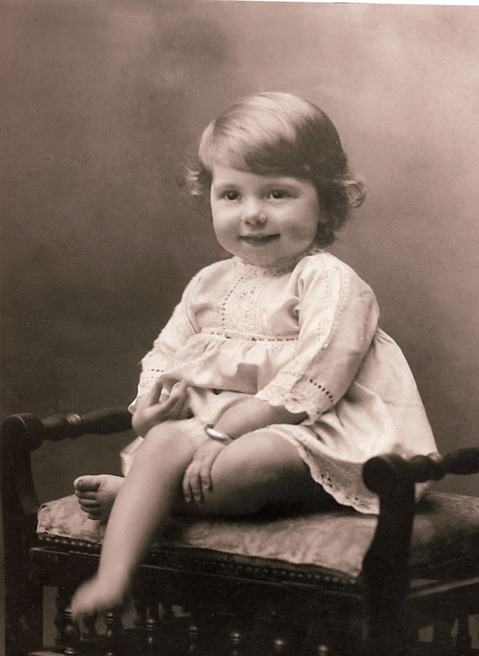Now that I look back on our happy carefree childhood, I have come to realize, even though we took it for granted, we lived a charmed life. Mothers didn’t work in those days, we’d never heard of latchkey kids, baby sitters, or pre-schoolers who were prematurely pushed out of the nest because their mothers were employed outside of the home. Mother’s place was always in the home, and a man’s pay cheque normally provided a substantial income.
The Fruit Orchards
My father’s job in the printing trade earned him a comfortable living. He had worked for the same company from the age of 14 years where he started as an apprentice, and even during the great depression of 1929 when so many men were laid off from their jobs, he went to work every day. At the retirement age of 65 he still wasn’t disposed to giving up his lifelong duties, and he continued working until he was well past his 70th year. He was a very quiet, private person who loved his garden and from him. I learned to love the garden as well. I would often sit beside his spade as he worked, turning the soil, I loved the sweet smell of the earth. He planted a large orchard in the rear of our property, there was always a variety of fruit to choose from, peaches, apricots, lemons, oranges, pears, apples, figs, and even an almond tree. The orchard was encompassed in an enclosed area where we had a hen house and fowl run, so the trees were well fertilized. We also had a quite an extensive strawberry patch which provided ample fruit for eating, as well as for wonderful jam that my mother made each year. Our pantry was always stocked with homemade jams, strawberry, apricot as well as fig. My father planted a quince tree, the fruit was quite sour to eat, but made wonderful jelly. Our apples were also used for jelly making. My mother would cook the fruit to a pulp, which she would pour into a large gauze bag and then she would string it up over the bathtub, where it hung for several days dripping into a large pot. She then added a gelling mixture to the juice to form a clear jelly. There is nothing more delectable than homemade jelly.
Nectarines were one of my favourite fruits, my father planted a tree, but unfortunately it died off and he never replaced it. Our next door neighbour’s tree was always laden with fruit, and to our delight it so happened that the tree grew alongside the fence that divided our properties, and was only an arm’s length away. It was too much of a temptation not to help ourselves when nobody was looking.
Selling Apricots With My Friend Dorrie
One summer, my friend Dorrie and I decided to take advantage of all this fresh fruit at our disposal, we had set our hearts on seeing a particular movie that was showing at the Capital Theatre in the city, and here was our chance. Dorrie knew she couldn’t ask for money at home, her father was out of work during the depression. We planned on picking a bucketful of apricots and selling them around the neighbourhood, the only problem was we didn’t own scales on which to weigh them, so we made sure each individual bag was filled to capacity. We had no idea how much to charge, so we agreed on the small sum of 3 pence a bag. In no time the local housewives bought us out, we were blissfully unaware that we were offering them a real bargain. When my mother returned home after shopping, I proudly informed her of our clever scheme, thinking she would be pleased, instead she promptly told us to return the money we had earned and tell our customers to keep the fruit. We were devastated, I couldn’t understand why she did such a terrible thing, but later I came to realize that she didn’t want her neighbours thinking the Carr family needed money by selling their fruit. I did eventually see the movie “The Trail of the Lonesome Pine”, I can’t remember if Dorrie ever got the opportunity. I loved the movie, it starred Henry Fonda and Fred McMurray, their first movie of both their long and distinguished careers.
As I mentioned, Dorrie’s father was out of work for several years and whenever Dorrie and I came in from school each day I would see her mother sitting at the kitchen table peeling potatoes. These were a government handout to people in their circumstances, and I got the impression that her family subsisted on potatoes. They owned two cockatoos, one was a lovely pink and grey galah, which they kept in a cage outside the kitchen door on their tiny back porch, the other was a large sulfur-crested white cockatoo that they kept in the kitchen on a wooden perch. At one end of the perch was a little tin cup that held the bird’s seed, and at the other end was the water cup. The cockatoo was chained to the perch, he was able to strut back and forth where he kept up a running conversation. The floor beneath his perch was covered with newspaper, but it was always such a mess from the birds’ droppings, along with discarded seed. Being used to my mother’s spotless kitchen, the Anderson kitchen to me was always so uninviting, the thought of eating food there made me feel queasy.
Dancing Lessons
My sister and I started taking dancing lessons not long after we moved to Pascoe Vale. My first memory was seeing my precocious sister, who was 4 years old at the time, standing on the stage singing “My Melancholy Baby”. Several times a week we would go straight from school to our dancing instructor’s home. She lived at the bottom of a long hill on Gaffney St., her name was Marjorie Whitworth, and in her younger years she had belonged to a dancing troupe who performed on the stage of the popular Tivoli theatre, a vaudeville house in the city. She would take us through our tap and ballet dance routines to the music of her player piano. Not only did we find so much pleasure in expressing ourselves in the dance, our big moment though came when we were able to perform on the stage. This was when our pantomimes were held each year at the Coburg Town Hall in front of a large audience. We children helped with promoting these venues by going around the neighbourhood every day after school to sell tickets. This we did several weeks before the big event. It was such an exciting time for us. One year my sister and I played the lead roles, she was the ‘Fairy Godmother’ and I was ‘Cinderella’. My pet cat was portrayed by one of the girls who was our star acrobat. My friend Dorrie was one of the Ugly Sisters. My mother sewed all our dancing costumes, although the elaborate ball gowns our teacher hired for the occasion. Luckily for Dorrie, her dancing lessons were free as her older brother Fred was keeping company with our teacher. Eventually they became husband and wife.
Ghost Stories, The Post Master’s Dastardly Deed
Every Sunday evening my sister and I would go along with Dorrie and her brother to the Whitworth house and we kids would sit on the floor in the front hall, along with Marjorie's’ 2 half sisters, huddled around the radio, and with the lights turned down low we would listen to the regular Sunday night broadcast of ghostly stories narrated by George Edwards. We would become absolutely petrified. On the way home Dorrie and her brother Fred would leave us on the corner of our street, and we would run as fast as our legs would carry us until we reached the safety of home. On the corner there was an old house where Mrs. Ford lived, she was an elderly woman who kept to herself, we rarely saw her. At night she would sit at her organ in the front room of her house, with the shades drawn and a candle flickering in the darkness, casting ghostly shadows. We could hear somber eerie music coming from the house, and we kids imagined all kinds of horrors going on inside. We were too scared to walk on the footpath in front of her house, and even across the street we ran until we were well past it. Our foreboding materialized into reality, as it turned out later. A lodger met his untimely death there. The man’s name was Bertie McLean. He had recently been appointed as postmaster by the district after the death of our long-time elderly postmaster. He was a bachelor and needed a place of residence within walking distance of the post office, which was located on the main road connecting our street. Mrs. Ford, who lived alone in her big sprawling house, was the likely candidate. Eventually Bertie became enamoured with his own self importance, being the recipient of this important position in the community, and so he decided to buy himself an automobile befitting his station in life, an expensive British roadster. He kept it in Mrs. Ford’s garage at the back of her property, which opened up onto a lane running alongside the house. We kids walked down the lane every morning to school, we would often peek through the opening between the doors, which were heavily padlocked, to admire that beautiful automobile inside. Bertie’s enjoyment of his new car was short-lived, he found he couldn’t afford the payments, so one night he set fire to it. The following morning on our way to school, we were shocked to see the burned out garage, and when we peered inside we could see the beautiful roadster reduced to a blackened shell. Bertie expected to claim the insurance, but it was very obvious that he was the perpetrator, so instead of waiting to be prosecuted, he shot himself in the head.
Another house in the district that set out imaginations agog, was a tiny cottage on the next street. Two spinsters lived there, and like Mrs. Ford, they were rarely seen. They dressed in somber dark clothes that dated back to the early part of the century, we were sure they both were witches and we didn’t ever dawdle near their cottage.



